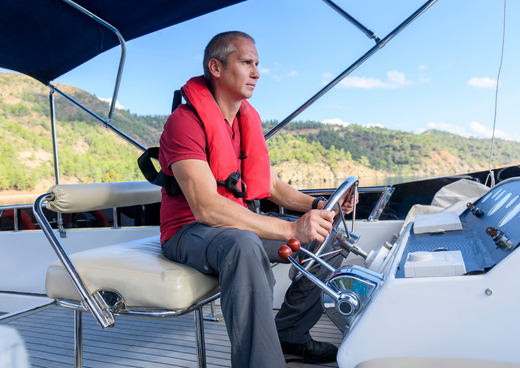When it comes to keeping your boat clean, look to Captains Preferred Products boat cleaning supplies. Find everything you need to keep your vessel squeaky clean all season — always at the best prices.

Safety Tips for New Boaters
Nicholas HeislerShare this article
If you’re new to recreational boating, it might seem like there are a lot of rules and regulations — so many, in fact, that you might wonder how anyone has any fun on boats at all.
Thankfully, once you get the right safety equipment and turn certain duties into habits, boating safety becomes second nature. Here’s what you need to know to stay safe.
1. Always Have Life Jackets on Board
Life jackets are more than just a wise precaution — they’re required by law. Regulations differ by state, but it’s generally safe to assume that you and your passengers need them.
You’ll need different size life jackets to accommodate people of all ages, from young children to adults. Check the size and weight ratings on your life jackets and make sure they’re matched to the wearer.
Contrary to what you may have heard, you should still wear a life jacket even if you’re a good swimmer. If you were to fall overboard, you could strike an object just below the surface. Should you be injured or knocked out, your lifejacket would buoy you so your head would be above water.
2. Avoid Alcohol
You aren’t allowed to drive drunk, and you aren’t allowed to boat drunk, either. In Florida, for example, anyone operating a boat must have a blood alcohol level (BAC) of less than 0.08. Violating laws governing BAC can bring fines and even jail time.
That said, those onboard who aren’t actively piloting the craft can drink. But just like a group of people enjoying a night bar hopping, it’s a good idea to have a designated driver.
3. Check the Weather
Weather patterns can change quickly. Unlike a car, you can’t just pull a boat over and wait out a storm. Turbulent waters can dump large quantities of water into the vessel, potentially sinking smaller craft.
With that in mind, always check the weather report to make sure you aren’t about to sail into a squall. Even just knowing the temperature can help ensure you don’t end up hours from shore in frigid conditions without appropriate clothing.
Preparing your boat for an incoming hurricane? Learn what to do.
4. Be Familiar With Distress Signals (and Have the Equipment to Send Them)
If you get into trouble, how will you signal for help? Keep in mind that you may not be able to rely on your cell phone, whether due to a lack of signal or a dead battery.
According to the U.S. Coast Guard, boaters need to have visual signals, such as high-visibility flags and flares. You must fly your flag at the highest point possible; as for the flares, red or orange is the best color for them, as they linger in the air longer.
What if you’re on the water at night and run into trouble? You’ll need electric signal lights that flash in the SOS pattern. This will also likely be where your flare gun comes in handy. Flares create a bright, burning trail that’s easy for onlookers to follow.
As for electronic distress tools, you’ll want to keep a Very High Frequency (VHF) marine radio on board. There are specific frequencies the Coast Guard monitors for distress calls, and these radios are much more reliable than cell phones or even CB radios.
You should also have an Emergency Position Indicating Radio Beacon (EPIRB), which sends out 406-MHz signals connected to GPS. These automatically send location information to bring rescuers right to you.
5. Stock Emergency Supplies
It’s imperative to have first aid kits on board to dress wounds. Whether someone accidentally catches a hook while fishing or slips and bumps their head, it’s important to be able to care for a range of injuries.
Additionally, keep flotation devices on board to toss to anyone who falls overboard and isn’t wearing a lifejacket for some reason.
Fire extinguishers are also a necessity. You never know when an overheating engine might catch fire or someone will get careless with a lit cigarette.
6. Take a Boating Safety Course
The National Association of Boating Law Administrators (NASBLA) provides safety courses to educate boaters on the rules of boating, including how to look for and obey markers and buoys and stay compliant with local laws.
If you live in an area that requires a boating license, you’ll need to complete one of these courses to be able to operate a boat legally.
Enjoy the Ride
Boating safety is critical, but it doesn’t have to be a burden. Just make a list of essential supplies, set aside time to take a safety course, and watch the weather when you want to go out for a day on the water. And remember: safe boating is fun boating!









